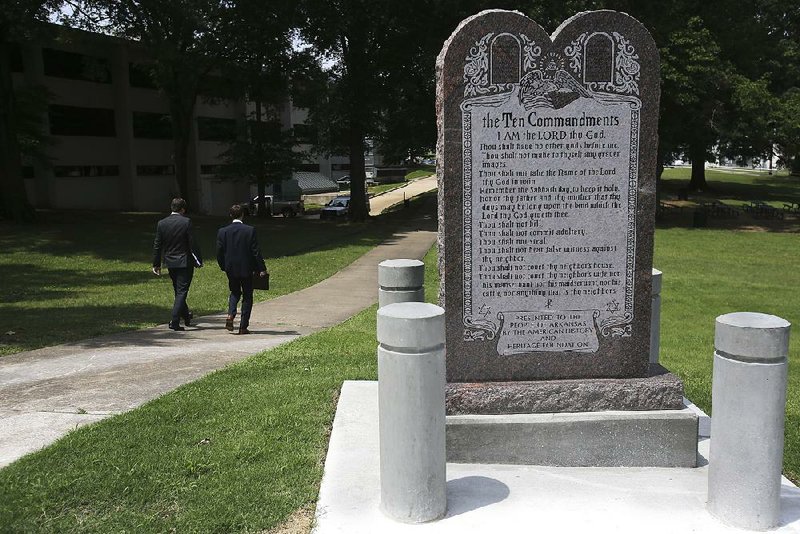A federal judge has scheduled a trial over the Ten Commandments monument at the state Capitol to begin July 13 in her Little Rock courtroom.
Two groups filed separate lawsuits, since merged, in 2018 to challenge the constitutionality of the monument's placement on the Capitol lawn. They allege that it violates the establishment clause of the First Amendment, constituting an illegal government endorsement of religion.
The two groups of plaintiffs are members of a walking and cycling club who are supported by the American Civil Liberties Union of Arkansas, and people representing a variety of religious viewpoints, led by the Arkansas Society of Freethinkers. Both want the monument removed.
An intervening group called the Satanic Temple, which describes its mission as "encouraging benevolence and empathy among all people," also contends that the monument represents an illegal government endorsement of religion. However, it seeks either removal or the placement of a second monument -- an 8 ½-foot-tall bronze statue of Baphomet, a deity that is part man, part goat -- on the grounds as well.
Last month, Attorney General Leslie Rutledge's office, which is representing the sole defendant, Secretary of State John Thurston, joined with the plaintiffs and intervenors in asking U.S. District Judge Kristine Baker to try the case without a jury. All agreed that because claims for monetary damages had been dropped in amended complaints, the only remaining claims are for declaratory and injunctive relief, which are matters for judges, but not juries, to decide.
The lawsuit seeks a declaratory finding that the monument is unconstitutional and an injunction ordering it to be removed.
Baker granted the request for a bench trial on Jan. 3, saying a scheduling order would follow, which it did Monday. It establishes deadlines for motions, status reports and the filing of pre-trial documents, including each side's proposed findings and conclusions by July 6.
A Ten Commandments monument was first installed on the Capitol grounds on June 27, 2017, but was rammed by a vehicle overnight and shattered into pieces. A replacement monument, this time surrounded by 3-foot-tall concrete posts, was installed April 26, 2018 in the same location.
Sen. Jason Rapert, R-Conway, is the director of the American History and Heritage Foundation, which donated the monument. He is also a founding member of the National Association of Christian Lawmakers, whose stated purpose is to establish a "more godly nation."
He isn't a defendant in the case, but gave a videotaped deposition whose dissemination Baker restricted at his request.
Last summer, on June 20, the U.S. Supreme Court overturned the 4th U.S. Circuit Court of Appeals concerning a 1925 memorial to fallen soldiers in World War I. The high court found by a vote of 7-2 that the 40-foot-tall memorial shaped like a Latin cross and sitting on public land in Maryland didn't violate the establishment clause of the First Amendment because of its historical value.
Attorneys for the state asked Baker to impose a stay on the Arkansas case until the Maryland case was decided, citing its potential impact on the Arkansas case, but attorneys for the plaintiffs opposed a stay. Baker denied the stay, saying she was skeptical that the American Legion case, as it is known, would affect the Arkansas case, which appears "to rest on facts very different from the facts underlying American Legion."
Metro on 02/12/2020
